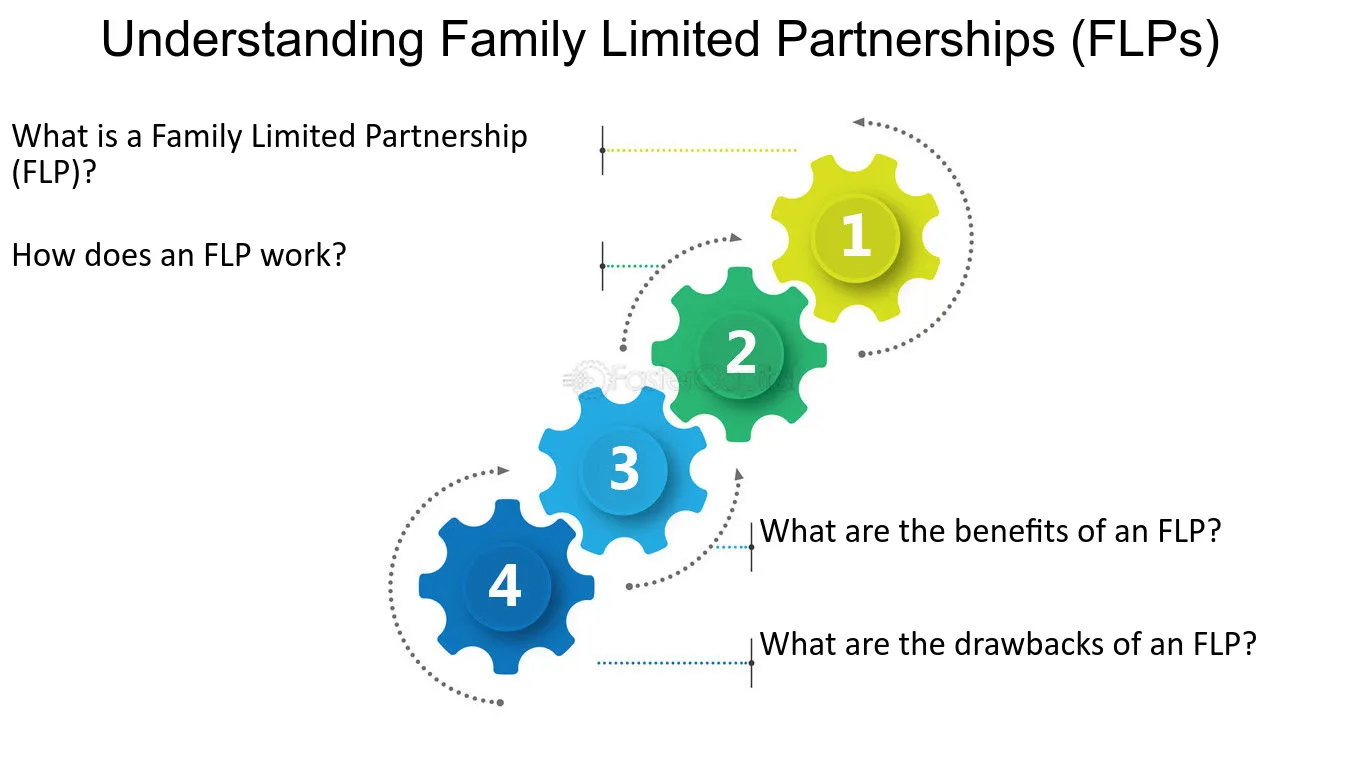Definition and Purpose
A Family Limited Partnership (FLP) is a legal structure that allows family members to pool their assets and manage them together as a partnership. It is formed by family members who contribute assets to the partnership and become partners in the business.
FLPs are commonly used by families who want to pass down their wealth to future generations while minimizing estate and gift taxes. By transferring assets to the partnership, the value of the assets can be discounted for tax purposes, reducing the potential tax liability. This can be especially beneficial for families with significant assets, as it allows them to transfer wealth to their heirs without incurring substantial tax burdens.
In addition to tax benefits, FLPs also provide a way for families to maintain control over their assets. The partnership agreement can specify how the assets will be managed and distributed, ensuring that the family’s wishes are carried out. This can be particularly important for families who have specific goals or objectives for their assets, such as preserving wealth for future generations or supporting charitable causes.
Overall, a Family Limited Partnership offers families a flexible and efficient way to manage and protect their assets, while also providing tax advantages and the ability to pass down wealth to future generations. It is important to consult with a qualified attorney or financial advisor to determine if an FLP is the right choice for your family and to ensure that it is structured and managed properly.
| Pros | Cons |
|---|---|
| Provides limited liability protection | Requires professional assistance to set up and maintain |
| Offers tax advantages | May have ongoing administrative and legal costs |
| Allows for efficient transfer of assets to future generations | May limit liquidity of assets |
| Enables families to maintain control over their assets | Requires compliance with partnership formalities |
Pros and Cons of Family Limited Partnership (FLP)
Pros of Family Limited Partnership (FLP)
- Asset protection: One of the main advantages of an FLP is that it provides a level of asset protection. By transferring assets to the partnership, they become separate from the individual’s personal assets, which can help protect them from creditors and legal claims.
- Estate planning: FLPs are often used as a tool for estate planning. By transferring assets to the partnership, individuals can reduce the value of their taxable estate, potentially minimizing estate taxes for future generations.
- Control and management: FLPs allow for the centralized management of family assets. The general partner, typically a family member, has control over the partnership and its assets, while limited partners have a passive role. This structure can help streamline decision-making and ensure continuity in managing family wealth.
- Flexibility: FLPs offer flexibility in terms of ownership and distribution of income. The partnership agreement can be customized to meet the specific needs and goals of the family, allowing for different levels of ownership and distribution among family members.
- Succession planning: FLPs can be an effective tool for succession planning. By transferring assets to the partnership, individuals can gradually pass on ownership and control to the next generation, ensuring a smooth transition of family wealth.
Cons of Family Limited Partnership (FLP)

- Complexity: Setting up and maintaining an FLP can be complex and require professional assistance. It involves drafting a partnership agreement, transferring assets, and complying with tax and legal requirements. This complexity can result in higher costs and administrative burdens.
- Loss of control: While FLPs provide control and management benefits, the general partner may face challenges in maintaining control over the partnership. Limited partners may have certain rights and can potentially challenge the decisions made by the general partner.
- IRS scrutiny: FLPs are subject to scrutiny by the Internal Revenue Service (IRS). The IRS closely examines FLPs to ensure that they are not being used for tax evasion or improper purposes. It is essential to comply with all tax regulations and maintain proper documentation to avoid potential issues.
- Limited marketability: Transferring assets to an FLP can limit their marketability. Limited partners may have restrictions on selling or transferring their partnership interests, which can make it challenging to access the value of the assets.
Overall, Family Limited Partnerships offer various advantages, such as asset protection, estate planning benefits, and centralized management. However, they also come with complexities, potential loss of control, and IRS scrutiny. It is essential to carefully consider the pros and cons before setting up an FLP and consult with legal and tax professionals to ensure compliance with all regulations.

Emily Bibb simplifies finance through bestselling books and articles, bridging complex concepts for everyday understanding. Engaging audiences via social media, she shares insights for financial success. Active in seminars and philanthropy, Bibb aims to create a more financially informed society, driven by her passion for empowering others.
